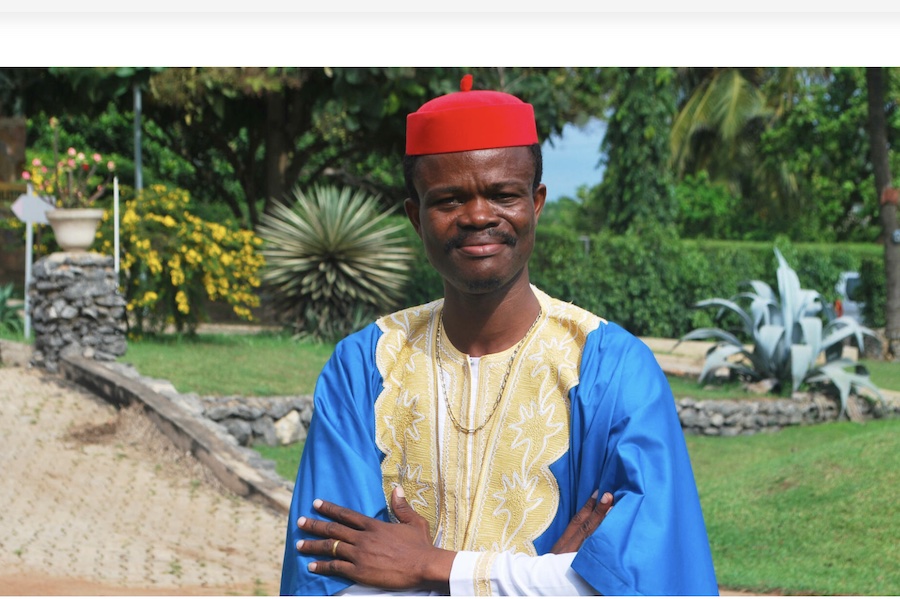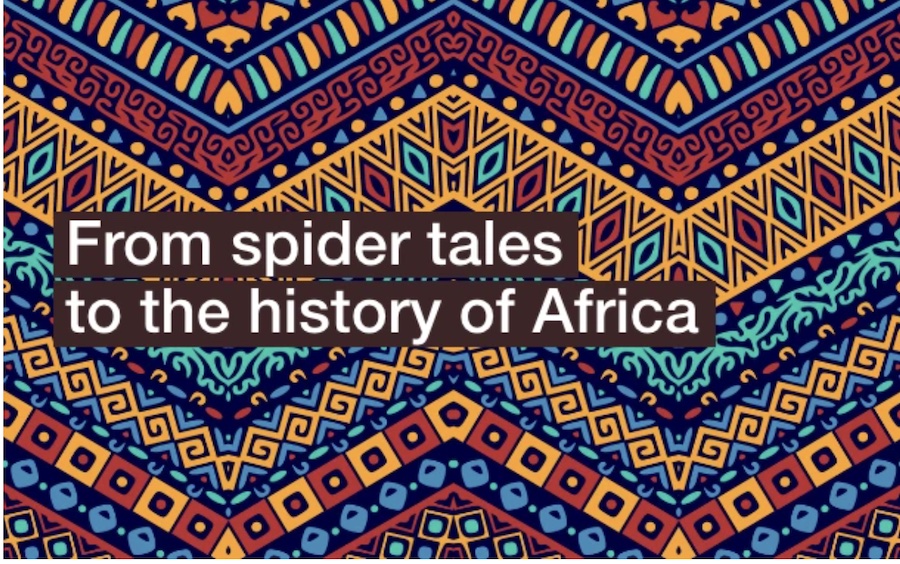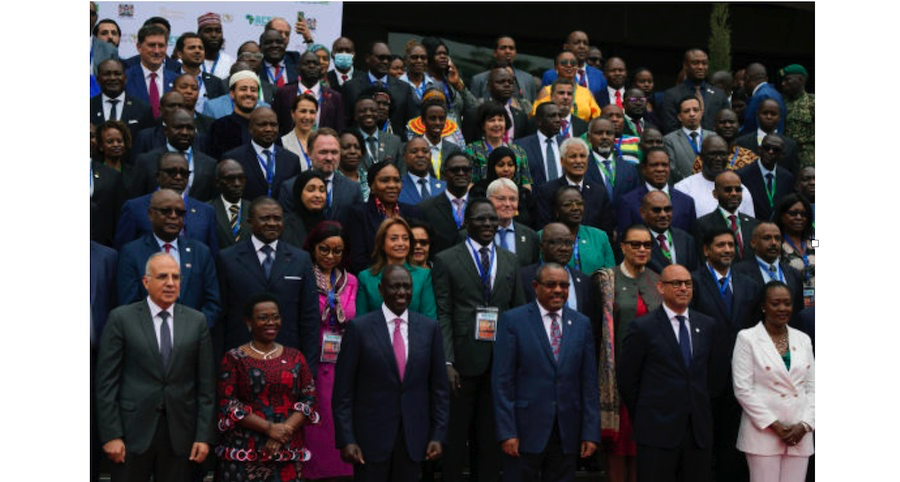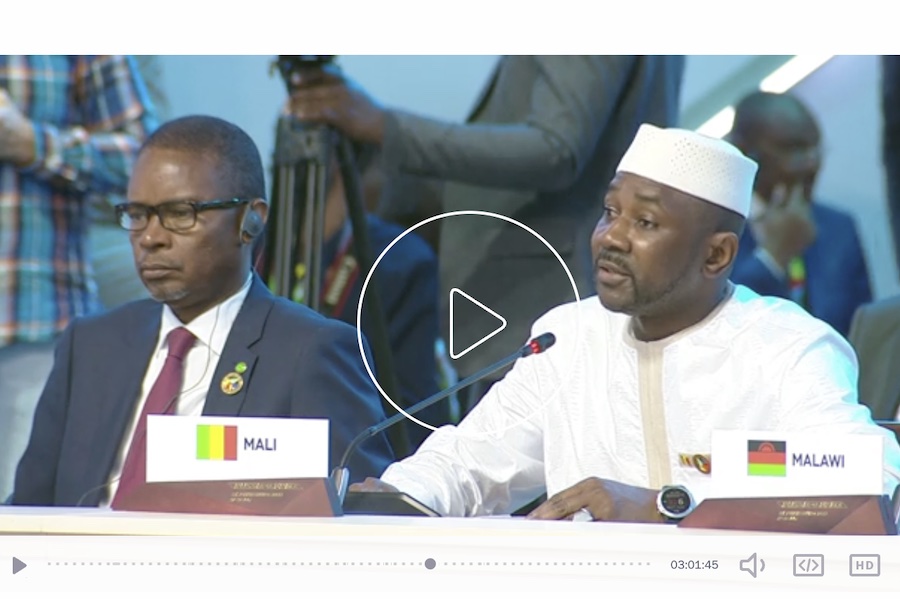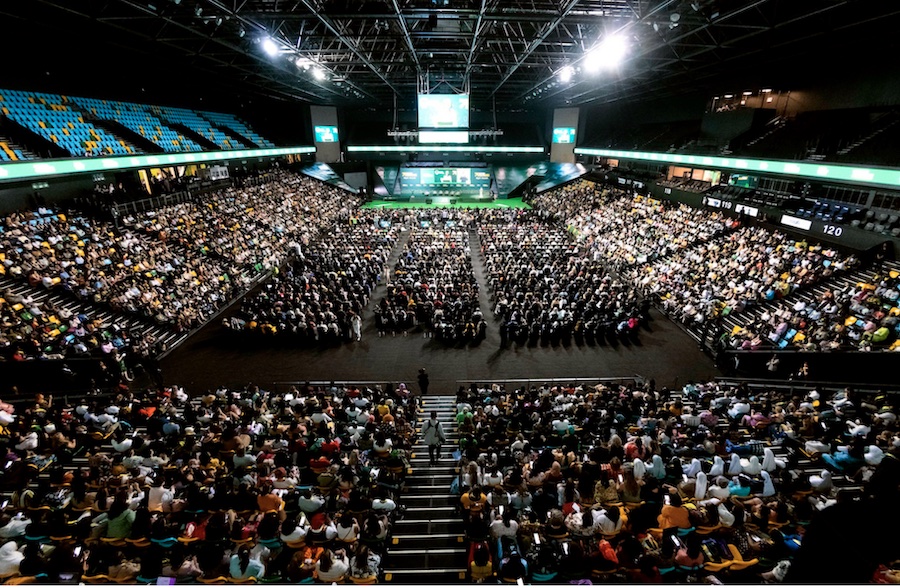FREE FLOW OF INFORMATION .
.
A survey by CPNN
The following 59 actions in 26 African countries include those listed in Google during the weeks of September 16-28 this year under the key words “International day of peace” and “Journée internationale de la paix.” The events also include some listed on the facebook page for the International Cities of Peace and the website of Campaign Nonviolence.
About 52 events are listed on the maps of One Day One Choir and Montessori schools singing for peace, but with the exception of 14 listed below, there is no indication which took place this year and which took place only in previous years.
For events in North Africa see the page of actions in the Arab States .
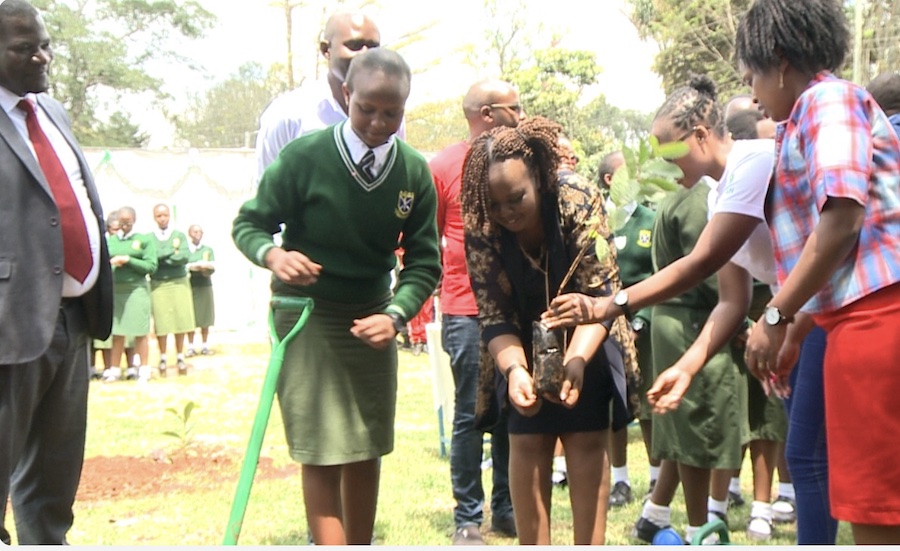
Planting trees in Kenya
Here are excerpts from the articles.
AFRICAN UNION:
Statement from the Commissioner for Political Affairs, Peace and Security, Ambassador Bankole Adeoye: On the occasion of International Day of Peace, I join our Leaders in wishing all the world of peaceful coexistence in which differences are resolved through dialogue without resorting to violence; a world in which the strength of our differences is harnessed as a rich tapestry of resources; a world of sustainable resource management that inclusively serves the needs of the present generation and ensures a legacy for future generations; and for our African continent, a world of good governance that enables us to use our rich endowments for the benefit of our people. . . .
ANGOLA: The Pan-African Forum for the Culture of Peace, also known as the Biennial, returns to Luanda for the third time. The state of preparation for this edition, which aims to educate for a culture of peace, was presented today in Luanda, at a time when the international day of peace is celebrated. The third edition will highlight youth as promoters of peace. Young people will have the opportunity to speak directly with the Heads of State and government. Women’s participation will also be analyzed.
BURKINA FASO: This is a message from the Minister of Justice and Human Rights, responsible for relations with institutions, Keeper of the Seals, on the occasion of the joint commemoration of the International Days of Peace and Tolerance (JIPT) 2023 edition. . . . I am taking the opportunity of these days which is offered to me to launch a vibrant appeal to all Burkinabè, whatever their age, their profession, their religion, their rite and their political affiliation to become aware of the situation we are experiencing, taking a step back from the events we are experiencing, experiencing a moment of awakening together and realizing that our only salvation is peace. . . As is the spirit of these days, in Burkina Faso, the joint commemoration of the International Days of Peace and Tolerance will be marked by a series of activities for the benefit of populations in general and young people and women in particular in the Central-East region. These will include conferences in schools, exchange meetings with local communities, slam and poetry competitions, awareness sessions followed by a women’s cycling race, radio broadcasts, parenting days joke and the official commemoration ceremony followed by a panel.
BURUNDI EU TEAM: The European Union team in Burundi celebrated the International Day of Peace on Thursday September 21, 2023 in Bujumbura. These ceremonies saw the participation of different executives from Burundi from different ministries. In her speech for the occasion, Elisabetta Pietrobon, delegate of the European Union to Burundi, said that the latter and its member states are sparing no effort in the fight for peace.
BURUNDI PROJECT INSIDE-OUT: On the occasion of the International Day of Peace this September 21, Mr. Jérémie BLIN, Ambassador of France to Burundi, and Ms. Elisabetta PIETROBON, new ambassador of the European Union (EU) inaugurated the exhibition “United for peace “. Created by French photographer Jean René (JR) as part of the “Inside Out Project”, this work is made of portraits, affixed to the facades of the Old East building in Bujumbura. As the French Ambassador indicated: “These 289 portraits bring together refugees, returnees and people involved in welcoming these communities in the different neighborhoods of Bujumbura. Choosing to treat this subject through the prism of art demonstrates our desire to highlight our common desire to live in a peaceful world. This work makes it possible to democratize culture and make it accessible to all. »
CAMEROON, GAROUA: The Alliance Francaise of Garuoua proposes to children to celebrate the International Day of Peace in workshops to design a dove of peace and to construct a wall of peace
CAMEROON HUMAN RIGHTS COMMISSION: The Cameroon Human Rights Commission (CHRC) appeals to separatist fighters in Ambazonia to lay down their weapons for 24 hours to commemorate the International Day of Peace, celebrated every September 21. On its official Facebook page, the CHRC asked the combatants to “respect twenty-four hours of non-violence and to refrain from any exaction” and to “make a significant gesture in favor of lasting peace, a vector of development”
CAMEROON, YAOUNDE: Festival International Ecran Slam, Friday Sept 15, a hybrid event online and live to promote peace on the International Day of Peace.
CENTRAL AFRICAN REPUBLIC: The Minister of Humanitarian Action and National Reconciliation, Virginie Baikoua, and the Deputy Special Representative of the UN Secretary-General, Mohamed Ag Ayoya, chaired the celebration of the International Day of Peace in Bouboui, 45 km from Bangui. It was an opportunity to discuss the benefits of peace resulting from the signing of good neighborly agreements and the consolidation of intercommunity cohesion, initiated with the support of local Peace and Reconciliation Committees as well as MINUSCA. . . . To close the ceremony, the participants and officials present were invited to plant trees to symbolize the peaceful resolution of conflicts (palaver tree) and sustainable development.
CHAD, MOUNDOU: It is through the theme “Action in favor of peace: our ambitions for the global goals”, that the Ministry of National Reconciliation and Social Cohesion and the United Nations system in Chad, celebrated the 2023 edition of the international day of peace. In his speech, the acting United Nations resident coordinator in Chad, Ouattara Yafflo , emphasizes that the path to peace requires patience, vigilance and Chad needs peace and this is the wish of the Chadian people. . . . For the Minister of National Reconciliation and Social Cohesion Abdramane Koulamallah , Chad engaged in the process of returning to constitutional order needs the effort of its children in favor of peace. The minister calls on administrative and political authorities, civil society and associations to increase collective peace actions in favor of Chadians.
CHAD, SALAMA PEACE INITIATIVE: The president of the Salama peace initiative association, Josiane Djikoloum Darwatoye launched, this Saturday, September 16, 2023, through a press briefing, the first edition of World Peace Week in Chad. As part of its activities, explains Josiane Djikoloum Darwatoye, Salama Peace Initiative is organizing World Peace Week for the first time in Chad, from September 16 to 23, 2023 under the theme “Actions for peace: our ambition for the objectives of sustainable development with a view to contributing to national, regional and international efforts aimed at strengthening lasting peace in Chad”. The general objective of this first edition of World Peace Week is to strengthen the commitment of young people and their role as leaders in the promotion of lasting peace, dialogue and social cohesion in their communities and in the world.
COMORES: The International Day of Peace was also celebrated in Moroni yesterday, September 21. On this occasion, a peaceful march was organized in the capital to warn of the dangers of conflicts and violence of all forms. Organizations such as Youth and Women Leaders for Peace, the non-governmental organization CAP and Respir-Comoros celebrated World Peace Day yesterday morning. . . . Akim Saïd Mchangama, coordinator of the NGO CAP, showed that the fight against violence against women and children is a fight that our organizations are committed to leading.
COTE D’IVOIRE: Côte d’Ivoire commemorated Thursday, September 21, 2023, in Abidjan the celebration of the International Day of Peace (IPD 2023), around the theme: “Youth, peace and sustainable development”. . . . The Minister of the Interior and Security, Vagondo Diomandé, who represented Prime Minister Patrick Achi at this ceremony, indicated that peace is a noble aspiration, in addition to being the guarantor of the march of States towards development. He noted that peace is not a given and that we must continue to build and consolidate it, through reconciliation and the strengthening of national cohesion.
DEMOCRATIC REPUBLIC OF CONGO, KINSHASA YOUTH: Like every year, the world celebrated the International Day of Peace on September 21. This day is particularly dedicated to a ceasefire in conflict zones. On this occasion, former scholarship holders from YALI/RDC, an active network of young African leaders, organized, in Kinshasa, for young people working in digital technology, an online seminar on the impact of speeches of hatred on national cohesion in the DRC.
DEMOCRATIC REPUBLIC OF CONGO, KINSHASA FORUM: Every year, the International Day of Peace is celebrated around the world on September 21. On this occasion, the National Forum of Positive Youth in the Democratic Republic of Congo, organized on September 21, 2023, the African Youth Dialogue for Peace #2023, in the third level master building of the Kinshasa Higher Institute of Commerce ( ISC-Kin), under the main theme “Youth, lasting peace and peaceful elections in Africa-DRC”.
DEMOCRATIC REPUBLIC OF CONGO, NORTH KIVU: The ASBL Young Patriots Consolidators of Peace (JPCP), which expressed itself in a declaration made public this Thursday, September 21, invites the various actors of peace, including the population and the authorities to live together . Its coordinator, Benjamin Asimoni, remains convinced that the peaceful resolution of conflicts is one of the avenues for the return of peace to Beni. Still on the sidelines of this day, Samuel-Don Katembo Sekanabo, president of the Youth Parliament in the town of Beni, who spoke, remains confident that unity and good collaboration between different peace actors will facilitate the return of peace. peace, which until then remains a utopia in the Beni region. . . . In Lubero territory, the active participation of women in the search for peace in the east of the DRC is very important. Message from Madame Mbambu Nzavake Mwamini, woman leader in Lubero territory on the occasion of World Peace Day this Thursday, September 21, 2023. For her, it is absurd to talk about the search for peace without involving the woman who is the first victim of insecurity.
DEMOCRATIC REPUBLIC OF CONGO, SOUTH KIVU: The United Nations Children’s Fund (UNICEF) officially launched the Young Peace Ambassadors program in South Kivu this Thursday, September 21 to mark the celebration of the International Day of Peace. This program consists of making around 400 young people ambassadors of local peace committees installed in all the communes, neighborhoods and avenues of the city of Bukavu and the territories of South Kivu.
GABON: The whole world celebrated the International Day of Peace. Gabon was not left out of this celebration. The women leaders of this country came together to show their attachment to the values of peace, sharing and above all Love. The event took place in the Lumière Chrétienne Church, in Libreville, on September 21, 2023. It was organized by CSOs: Women of FIRE; Gabon Group R. 1325; Cry of Women; Women’s Democracy Challenge. . . . In her presentation, the Peace Mediator, Caleopie Elloue, continued to recall the importance of peace and its necessity in a country like Gabon. While saluting the genius of the army which, without bloodshed, liberated the Gabonese as a whole, this women’s rights lawyer defined peace as “a relationship of well-being, of living well, of living together , living together based on respect for others, living in harmony, promoting peace. Promoting peace is being human.”
GUINEA BISSAU: Under the theme “Peace Begins with Me”, the Peace Observatory project – Nô Cudji Paz, in partnership with the National Popular Assembly and the Coordination of the United Nations System in Guinea-Bissau, celebrates the International Day of Peace – September 21st , with a special session alluding to the anniversary. This initiative aims to contribute to social cohesion and consolidation of peace, through debate and reflection on the role, by all national actors, in preventing radicalism and violent extremism in Guinea-Bissau. It is also intended to call on Guineans to the importance of recognizing the individual and collective responsibility of the Guinean people in promoting the values of national cohesion and peace. The event will bring together the worthy deputies, representatives of sovereign bodies, members of the Government, Defense and Security Forces, Diplomatic Corps, Traditional and Religious Leaders and civil society organizations.
KENYA: In a remarkable display of commitment to environmental sustainability and the celebration of peace, the Global Peace Foundation Kenya, in collaboration with the Chandaria Foundation, the Standard Group, and the Nairobi Primary, spearheaded a tree planting campaign to commemorate the United Nations International Day of Peace. Under the theme “Action for Peace; Ambitions for Global Goals,” the 2023 celebrations witnessed the planting of over 2000 trees at Alliance High School and Alliance Girls High School. The event also marked the official launch of Chandaria Tree Nurseries, each with a capacity of 100,000 seedlings, at both institutions. Highlighting the significance of this initiative, Ms. Beverly Moss, Secretary of Peace Building and Conflict Management in the Office of the President, commended the Global Peace Foundation and the Chandaria Foundation for their invaluable support in government-led efforts to mitigate climate change through tree planting. The creation of the tree nurseries aligns with the Million Tree Growing campaign, a joint effort between the Global Peace Foundation Kenya and the Chandaria Foundation. As part of this campaign, nine tree nurseries have been established in primary schools, secondary schools, and universities. With the aim of growing 15 billion trees by 2032, as called for by President William Ruto, this campaign serves to enhance Kenya’s forest cover and contribute to environmental sustainability
LAKE CHAD: Hello and welcome to your weekly radio show Kura Bari. We will exchange peace this week. Indeed, every year around the world we celebrate the International Day of Peace on September 21. . . . The culture of peace is a culture of dialogue and prevention and, in this context, the role of the United Nations has never been so crucial. . . . But what does this day mean for the countries of the lake basin which have jointly faced insecurity for more than a decade? In any case, this is the question that will be the subject of discussions today. We are talking about it with Nodjigoto CHARBONNEL, President of the youth association for peace and non-violence and Désiré Oubadjimdehba, Independent Consultant, program manager and coordinator of activities of the YOUTHCONNEKT-CHAD program.
MALAWI: Center for Enlightenment and Development. Action for Campaign Nonviolence. September 30, 2023 – October 04, 2023. We will hold workshops to empower female youth in decision-making in their lives and teach them ways to counter harassment. . . . These trainings will be geared towards female youth who are currently married. We will teach skills that they can demonstrate at family and community levels. The issues of property grabbing, date-rape, and various relationship dynamics will be addressed.
Question for this article
What has happened this year (2023) for the International Day of Peace?
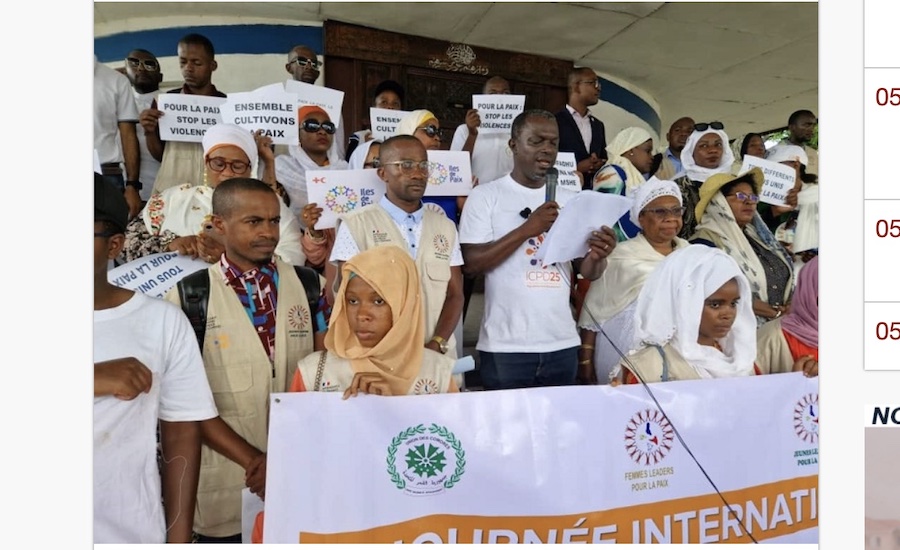
Comores
(Survey continued from left column)
MALI NATIONAL RECONCILIATION WEEK: “Meeting the challenges of an inclusive and lasting peace” is the theme of the 2nd edition of the National Week of Reconciliation (Senare) launched last Friday by the Minister of Reconciliation, Peace and National Cohesion, in charge of the Agreement for Peace and National Reconciliation, Colonel-Major, Ismaël Wagué. It was during a press briefing held on the premises of his department. . . . The Senare began on Friday with the reading of the Koran at the Great Mosque of Bamako, followed by the purchase of oxen for the benefit of the needy. A conference on security was hosted last Saturday at the Alioune Blondin Bèye peacekeeping school by the authorities of the Ministry of Security and Civil Protection in collaboration with those of the Ministry in charge of Reconciliation. Sports activities at the sports palace followed Sunday’s masses. The rest of the program will be devoted to a women’s day of reflection, a youth conference, the delivery of various donations and a conference of economic operators.
MALI CONFERENCE DEBATE: On the occasion of this International Day of Peace, a conference debate was organized on the theme “Digital technology, disinformation and peace: the role of African youth”. According to the speakers, the aim was to understand and address the challenges posed by the interaction between digital technology, disinformation and peace. Abdoulaye Guindo, Coordinator of Benbere is one of the speakers.
MAURITIUS: Global Peace Chain Mauritius, an organization aiming to promote living together and social inclusion, organized an event this Thursday which highlighted Mauritius as an example of peace in the world. . . . . Precisely, during this ceremony, several personalities were present, including the Vice-President of the Republic, Eddy Boissézon. Click here for video.
NAMIBIA: This past week the Windhoek International School celebrated our Namibian Heritage Week alongside the International Day of Peace (IDP) on 21 September. . . . So on this International Day of Peace and during our Namibian Heritage Week, let’s all do our part – within our families, within our school, within our social/religious groups, and within our countries–to build peace.
NIGER: In Niger, particularly in Agadez, several actors in the social life of the region, inspired by the declaration of UN Secretary-General Antonio Guterres for the International Day of Peace, spoke out on the occasion of this day. . . . In his address, His Highness Oumarou Ibrahim Oumarou reiteated the commitment of the Sultanate and all the Ulemas of Air to continue the initiatives for peace. . . . the group of young ambassadors for peace from Agadez in collaboration with the Youth Action Movemet made a donation and a tree planting session. “The message that we wish to leave through these actions is that of promoting the values of peace and solidarity.”
NIGERIA, ABEOKUTA: A group, Aviary Association Worldwide, has called on parents to revive the norms and value system in the training of their children. The group said the incessant cult clashes were due to lack of peaceful orientation from home. This form part of the group’s communiqué, while marking the 2023 International Peace Day held at the NUJ secretariat, Iwe Iroyin, Abeokuta. The vice president of the group, Adebayo Oniyide, noted that once Nigerians internalise the virtue of patience, cultivating peace will be simple. . . . Meanwhile, the Ogun state president of Gateway AVIARY, Abiodun Abiodu, expressed concern over the negative reports on cultism clashes that led to the killing of scores in Sagamu area of the state.
NIGERIA, ABUJA: Rotary International District 9125 and Peace Corps of Nigeria have stressed the need for peaceful co-existence among people of diverse ethnic and religious backgrounds in the country. They said this at a peace awareness walk, organised to commemorate the 2023 International Day of Peace on Thursday in Abuja. National Commandant, Peace Corps of Nigeria, Dr Dickson Akoh, called on Nigerians to live in peace with one another and shun social vices that might make the country ungovernable. “In Nigeria today, we have a couple of challenges, leading to needless loss of lives and property, but the fact that we still remain united as a nation deserves celebration. We want to use this day to call on some of the youth who have taken up arms against one other or the state to stop it in the interest of development.”
NIGERIA, ASABA: Delta State Government has said it would continue to strengthen the ideals of peace among the ethnic nationalities in the state by ensuring equity, fairness and justice for all Deltans. Special Adviser to the Governor on Peace Building and Conflict Resolution, Edwin Uzor, stated this in Asaba, when be briefed newsmen on the commemoration of the 2023 International Peace Day, Uzor said government was conscious of the fact that only peace and security could engender growth and development in the communities and the state at large, pointing out that the Governor Sheriff Oborevwori administration was keen on resolving lingering intra and inter communal crisis in the state, including the one between Aladja and Ogbe-Ijoh.
NIGERIA, IBADAN: As part of its activities to mark the year 2023 World Peace Day, the Rotary Club of Ibadan engaged stakeholders across the geo-political zones of Oyo State on the need to sustain the peaceful coexistence enjoyed among all and sundry in the State. Stakeholders that gathered at the House of Chiefs Parliament Building, Agodi Secretariat Ibadan for the year 2023 World Peace Day organized by Rotary Club of Ibadan include the representative of the Oyo State Commissioner of Police, CP Adebola Hamzat, the representative of Myyetti Allah Cattle Dealers and Breeders Association Oyo State chapter,, All Farmers Association of Nigeria, Oyo State chapter, a representative from the state Ministry of Judiciary, representative of Amotekun Corps, the religion leader, Transport Unions and workers, among others.
NIGERIA, KADUNA: Government agencies and non- governmental organizations involved in working for Peace and harmony in Kaduna state have commenced celebration of the International Day of Peace with dialogue ahead of the September 21st 2023, UN World Peace Day (WPD). Representatives of the various bodies which cut across different faith based organizations and religious leaders commenced the celebration with opening addresses and interactive session on ways to achieved peace in Kaduna state and Nigeria in general at the Interfaith Mediation Centre (IMF), Kaduna. Speaking, Kaduna State Peace Commission representative, Didam Bobby Swam, expanded that activities line up for the September 21st 2023 international day of Peace, includes IDPs education at Maraban rido concert, football March final, symposium, cultural dancer. . . . Stakeholders in attendants includes Action Aid, Kaduna Network for Peace, Doma Peace Devt. IMC- host, CIPP structures, religious leaders. Christian and Muslims among others.
NIGERIA, KANO: Kano state government is planning big for this year’s International Peace Day holding on September 21. The state Commissioner of Information and Internal Affairs, Baba Halilu Dantiye has also reiterated Governor Abba Kabir Yusuf’s determination towards ensuring peace, order, and security of lives and property of residents in the state. Dantiye made this known when he received members of the Committee for International Peace Day and launch of Peace Magazine headed by the Managing Director of Radio Kano, Comrade Hisham Habib.
REUNION: Festival for Peace from September 22 to 24, 2023 from 9 a.m. to 10 p.m. at the Verger de Mahavel at Ravine des Cabris. Every year, around the world, we celebrate the International Day of Peace on September 21. It is within the framework of this day that Zétinsèl is organizing its first edition in Reunion this year. It will be celebrated in the form of a Festival from September 22 to 24, 2023 at the Verger de Mahavel.
SEYCHELLES UNIVERSITY: The International Day of Peace Committee (Seychelles) has organized two events September 21 under the United Nations’ chosen theme: ‘Actions for Peace: Our Ambition for the #GlobalGoals.”
1) “My Sustainable Tree” Planting Venue: Playing Field, Mont Fleuri
2) Peace Day Ceremony. Venue: Peace Park, Victoria
SEYCHELLES ISIS: The International School Seychelles (ISS) came alive with the spirit of unity and peace as students and staff enthusiastically celebrated International Peace Day. Primary activities: As the sun rose on this special day, primary pupils wrote a peace message on a heart-shaped template and lovingly affixed it to a vibrant peace banner, which adorned the school’s lobby. . . .Year 3 and Year 4 students showcased their musical talents by learning and performing ‘Last Night I Had the Strangest Dream’ by Simon and Garfunkel. . . . The grand culmination of the primary activities was when the entire school gathered in the main play area, each class assembled with a letter drawn to spell out ‘Peace Day’. Secondary activities: The secondary students at ISS engaged in creative activities that reflected their commitment to peace. They crafted beautiful peace doves, symbolising hope and unity. Additionally, they created intricate paper plate wreaths, showcasing their artistic talents while embodying the spirit of harmony.
SIERRA LEONE-ICPC: In commemorations of the World Peace Day, the Independent Commission for Peace and National Cohesion (ICPNC) in partnership with Talking Drum Studio, UNESCO and Agiamondo has on Thursday 21st September 2023 commemorated the World Peace Day, with the theme: “Action for Peace; Our Ambition for the Global Goals, Ensuring the Right”
SIERRA LEONE – CARITAS: In his message to mark the International Day of Peace, the Executive Director of Caritas Freetown commended Sierra Leoneans for recovering from the ravages of civil war, noting that the West African nation has a room for maneuver to ensure lasting cohesion. In a message sent to ACI Africa on Thursday, September 21, when the entire world observed Peace Day, Father Peter Konteh said the commemoration was particularly important for Sierra Leone, which experienced a 20-year civil war. 11 years which ended in 2002, leaving behind much destruction. He adds: “While progress has been made in healing, justice and reconciliation after the war, challenges remain. It is essential to tackle poverty, inequality and governance issues, to promote a inclusive development and encourage social cohesion to ensure lasting peace.” In his message, the clergyman from the Archdiocese of Freetown highlights the need for continued efforts “to build a future where peace and stability are firmly established, allowing Sierra Leone and its people to prosper.”
SOUTH SUDAN, JUBA: Stirring speeches and cultural performances were aplenty as South Sudan marked International Day of Peace at the Nyakuron Cultural Center in the capital city, Juba, in the presence of communities, government officials, and international partners. Click here for the video.
SOUTH SUDAN-UNMISS: In the bustling capital of South Sudan, a symphony of voices converged, setting the stage for this year’s commemoration of the International Day of Peace. . . . Organized by the Central Equatoria State’s Ministry of Peace Building in collaboration with the Community Outreach and Advocacy Unit of the United Nations Mission in South Sudan, the forum was attended by state Minister of Peacebuilding, Francis Gerald, religious leaders, academia, civil society, state government officials, businessmen, students, the media, and senior representatives from the UN Peacekeeping mission. Speaking at the event, Professor Julia Duany, an educator from the University of Juba’s College of Education, called on South Sudanese citizens to embrace a shared national identity. . . Reverend Martin Ocaya, the Coordinator of the Justice and Peace Commission of the Catholic Diocese in Juba, added his voice to this chorus of hope, underscoring the pivotal role played by faith-based groups in South Sudan’s journey towards peace, advocating for a method rooted in inclusivity, consultation, and grassroots engagement.
TANZANIA: Zanzibar Peace,Truth & Transparency Association. INTERNATIONAL WORLD PEACE DAY 21 SEPTEMBER 2023. Our actions support the values of True Culture of Peace (Positive Peace), possible to achieve the level of trust, and cooperation, Empowerment and Poverty reduction in Zanzibar Community and Tanzania.
TOGO WILPF: Each year, September 21 is celebrated as the International Day of Peace. The Togolese section of WILPF commemorated September 21, this day by declaiming poems in favor of peace. It was in the conference room of the national commission to combat the proliferation of small arms and light weapons in Lomé. Several members of this association therefore read various poems in order to call on the world to safeguard this rare commodity that is peace.
TOGO, DAPAONG: The celebration of the International Day of Peace was marked by the animation of socio-cultural events in support of municipal and regional initiatives for social cohesion and peace. It is an awareness caravan and a football match coupled with the presentation of honorary prizes. . . . The participants in this celebration started this demonstration with a caravan in the arteries of the town of Dapaong. On motorcycles and cars, dressed in t-shirts, equipped with banners and accompanied by a brass band, they drew the attention of the populations to the merits of peace, living together and social cohesion without which there is no development. This caravan went to the municipal field of Dapaong, where a gala football match pitted the team – made up of members of the project team and CSOs – and that of the media from the Savanes region.
TOGO-UNIC: The whole world celebrated World Peace Day on September 21, 2023, with the theme: “Action in favor of peace: our ambitions for the Global Goals”. To mark this edition in Togo, the United Nations Information Center (UNIC-Togo) organized a public health activity in collaboration with the neighborhood development committees (CDQ) of the tokoin Tame, Wuiti and Aviation districts in the Gulf 2 commune.
UGANDA: Video September 21.·Kangulumira Kayunga district Uganda feast day, International Cities of Peace.
***** MONTESSORI *****
In addition to the events listed above, there were 14 new events in Africa to celebrate the International Day of Peace on the website of the Montessori Schools, i.e. events that were not listed last year:
Namibia : Walvis Bay
South Africa : Cape Town (2), Eastern Cape, Gonubie, Johannesburg, Northern Cape, Pretoria (2), Radioikop, Senekai, Western Cape (2)
Reunion: Saint-Andre
